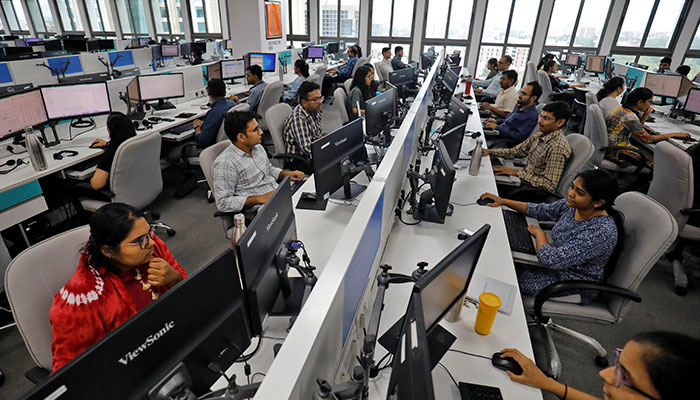Tech-driven workforce efficiency
LAHORE: Industries across Pakistan are grappling with workforce challenges amid rapid technological advancements and rising wages for skilled workers. Economists suggest that modernisation through technology could lead to ‘creative destruction’ -- replacing traditional labour with a technologically advanced workforce.
Experts emphasise that Pakistan needs to upgrade its industrial technology to compete on the global stage. Replacing outdated, inefficient machinery with energy-efficient alternatives would not only lower production costs but also reduce workforce requirements. For example, in the early 2000s, spinners in the textile sector manually removed impurities from cotton with the help of 300-500 workers. Despite this labour force, some contaminants remained, resulting in penalties from international yarn buyers.
Today, laser technology has largely replaced this manual process, reducing the required workforce to just two or three employees while virtually eliminating contamination risks.In another instance, textile spinners have upgraded to new energy-efficient spindles that consume 40 per cent less power and have cut labour requirements by a third. As energy costs soar, only those spinners who have modernized are faring well, while those still operating outdated machinery face closure or struggle to survive.
Technology upgrades improve both product quality and operational efficiency, allowing businesses to stay competitive in global and domestic markets. The plastics industry, for example, has seen older blow moulding machines rendered obsolete as newer models now produce two to three times more output using the same power. While these new machines require the same number of operators, they are significantly more productive, driving growth without increasing energy use or labour costs.
However, few Pakistani entrepreneurs have embraced these advancements. They must recognise that energy costs will likely remain high in Pakistan, and wages will continue to rise as the minimum wage increases regardless of productivity improvements. Industrial competition has shifted in recent years, favouring highly educated workforces capable of operating rapidly evolving technologies. Automation and robotics demand even greater technological expertise, creating a need for skilled labour.
Technological advances have even transformed the transport industry, as sensor technology now tracks vehicles in real-time, displacing workers who lack access to such tools. This trend is leading to greater income inequality, with high-tech adopters pulling ahead.
For Pakistan to maintain its productivity and competitiveness globally, it must invest in technology and develop a workforce equipped to meet modern demands. Without these changes, the country risks stagnating productivity and falling further behind on the global economic stage.
-
 Prevent Cancer With These Simple Lifestyle Changes
Prevent Cancer With These Simple Lifestyle Changes -
 Experts Reveal Keto Diet As Key To Treating Depression
Experts Reveal Keto Diet As Key To Treating Depression -
 Inter Miami Vs Barcelona SC Recap As Messi Shines With Goal And Assist
Inter Miami Vs Barcelona SC Recap As Messi Shines With Goal And Assist -
 David Beckham Pays Tribute To Estranged Son Brooklyn Amid Ongoing Family Rift
David Beckham Pays Tribute To Estranged Son Brooklyn Amid Ongoing Family Rift -
 Jailton Almeida Speaks Out After UFC Controversy And Short Notice Fight Booking
Jailton Almeida Speaks Out After UFC Controversy And Short Notice Fight Booking -
 Extreme Cold Warning Issued As Blizzard Hits Southern Ontario Including Toronto
Extreme Cold Warning Issued As Blizzard Hits Southern Ontario Including Toronto -
 Lana Del Rey Announces New Single Co-written With Husband Jeremy Dufrene
Lana Del Rey Announces New Single Co-written With Husband Jeremy Dufrene -
 Ukraine-Russia Talks Heat Up As Zelenskyy Warns Of US Pressure Before Elections
Ukraine-Russia Talks Heat Up As Zelenskyy Warns Of US Pressure Before Elections -
 Lil Nas X Spotted Buying Used Refrigerator After Backlash Over Nude Public Meltdown
Lil Nas X Spotted Buying Used Refrigerator After Backlash Over Nude Public Meltdown -
 Caleb McLaughlin Shares His Resume For This Major Role
Caleb McLaughlin Shares His Resume For This Major Role -
 King Charles Carries With ‘dignity’ As Andrew Lets Down
King Charles Carries With ‘dignity’ As Andrew Lets Down -
 Brooklyn Beckham Covers Up More Tattoos Linked To His Family Amid Rift
Brooklyn Beckham Covers Up More Tattoos Linked To His Family Amid Rift -
 Shamed Andrew Agreed To ‘go Quietly’ If King Protects Daughters
Shamed Andrew Agreed To ‘go Quietly’ If King Protects Daughters -
 Candace Cameron Bure Says She’s Supporting Lori Loughlin After Separation From Mossimo Giannulli
Candace Cameron Bure Says She’s Supporting Lori Loughlin After Separation From Mossimo Giannulli -
 Princess Beatrice, Eugenie Are ‘not Innocent’ In Epstein Drama
Princess Beatrice, Eugenie Are ‘not Innocent’ In Epstein Drama -
 Reese Witherspoon Goes 'boss' Mode On 'Legally Blonde' Prequel
Reese Witherspoon Goes 'boss' Mode On 'Legally Blonde' Prequel




